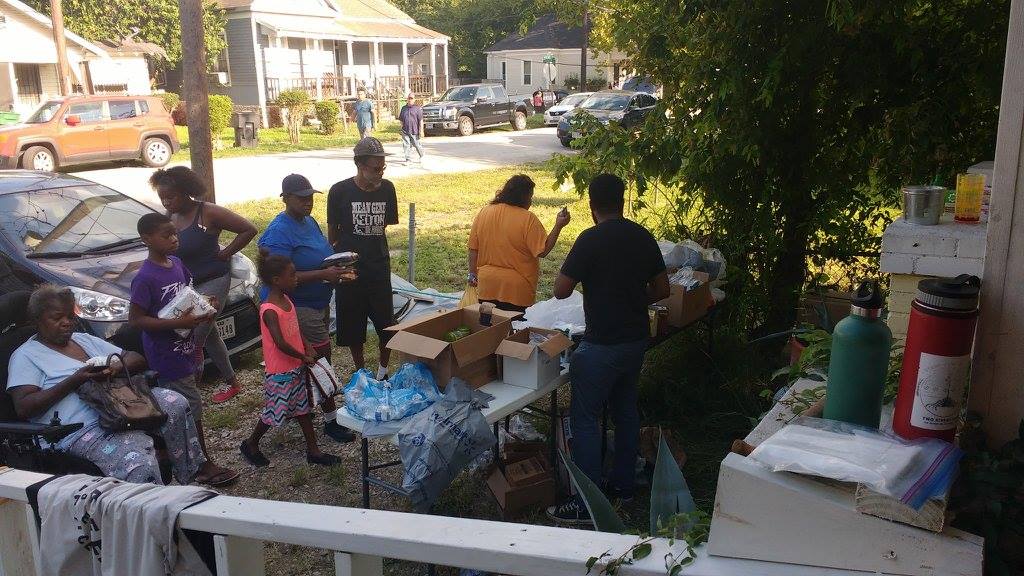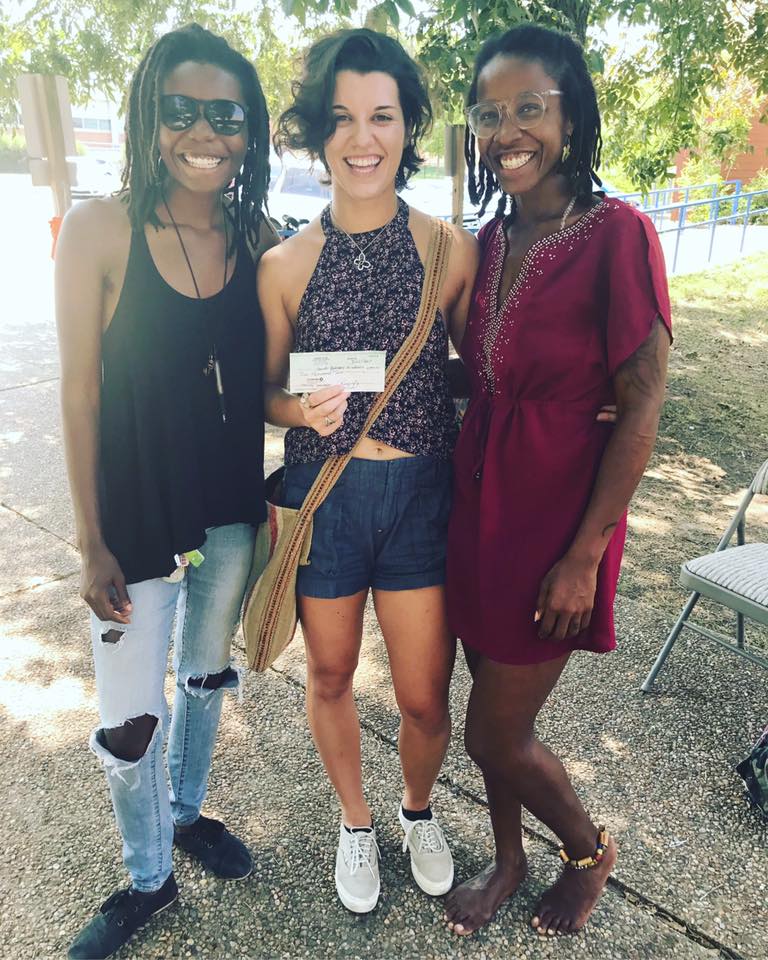By Larisa Manescu
When Hurricane Harvey devastated Texas almost a month ago, we witnessed more than a powerful storm. We experienced the power of a deeply rooted grassroots effort to ensure a just recovery.
We knew we had the power to drive action to that effort. Sierra Club is not a disaster relief organization, but we have the capacity to fundraise and get much needed financial resources to the people and organizations that can use them in the best ways for their communities. Thanks to Sierra Club members and supporters across the nation, we were able to support home-grown alternatives to the big relief organizations.
The last few weeks have been a flurry of movement, physical and digital, personal and political. Our coastal cities were underwater and millions of people were (and still are) at risk of coming in contact with harmful toxic pollution in one of the most industrialized areas in the nation in the aftermath. Refineries that went into shut-down mode in preparation for Harvey emitted their excess chemicals, contributing to air pollution and exaberating the environmental injustice that frontline communities have had to live with for long before Harvey hit. (Photo: A chemical flare in Houston's East End, captured by Sierra Club Gulf Coast Dirty Fuels Organizer Bryan Parras)
Texas Sierra Club staff members and volunteers were checking in on family, friends, and loved ones, while working tirelessly to organize Harvey relief.
Natural disasters don’t discriminate in terms of where they hit, but the recovery process is not an equal one. What is a financial setback for some families is a total loss of livelihood for others. From what we’ve seen from the aftermath of hurricanes and floods past, the status quo of disaster recovery leaves people scrambling to piece together their lives for years, caught up in the bureaucracy of big relief organizations and taken advantage of by disaster capitalism.
We see an opportunity to aid in reinventing disaster relief, to act as a fundraising vessel to support frontline organizations and individuals that we know were operating with the values of justice and transparency, putting in the work to uplift vulnerable communities.
It hasn’t been difficult to identify these organizations. We’ve relied on already existing partnerships to pinpoint who’s been working on the ground for Harvey recovery. We see this process as the building blocks of building a movement centered around social and environmental justice.
They are the ones coordinating around-the-clock to put people into beds and provide warm meals, to provide a space and resources for evacuees to fill out confusing paperwork. They are removing damaged furniture and belongings from flooded houses and gathering the necessary supplies to rebuild. They are treating people with dignity instead of pity.
Some organizations were born in the wake of Harvey, like West Street Recovery working to support Houston’s 5th and 3rd wards, predominately black and brown communities. 
From West St. Recovery: "When people couldn't make it to the large corporate shelters, we intentionally position our distribution locations in areas where people who need resources the most can simply walk to us."
Others, like Tejas Environmental Justice Advocacy Services (known as tejas), have a track record of years of experience working for environmental justice.
Many are community organizations first and foremost, such as Counter Balance ATX in Austin or CIDA Inc. in Port Arthur. For them, diving into Harvey relief work was a no brainer. They saw no other option than to stop their own worlds when Harvey abruptly stopped the worlds of their neighbors. Counter Balance ATX Co-Founders Kristina Brown (left) and Fatima Mann (right) jumped into Harvey relief work with their Community Restoration Initiative, working out of the Wildflower Church in Austin, Texas to provide meals and resources to Harvey evacuees. Texas Sierra Club supports Counter Balance's efforts to set up a permanent space in East Austin.
Counter Balance ATX Co-Founders Kristina Brown (left) and Fatima Mann (right) jumped into Harvey relief work with their Community Restoration Initiative, working out of the Wildflower Church in Austin, Texas to provide meals and resources to Harvey evacuees. Texas Sierra Club supports Counter Balance's efforts to set up a permanent space in East Austin.
Despite different missions and locations, these organizations operate on the shared values of the Jemez Principles of Democratic Organizing that emphasize inclusivity, bottom-up organizing, and self-transformation.
Because of you, we’ve been able to raise over $170,000 for Harvey relief. That's monumental.
Of that, we’ve granted $51,500 so far to organizations on the ground helping with recovery, relief, and advocacy, and there is much more to come. This is how the money you’ve raised has been helping those affected:
West Street Recovery Team (WSRT) in northeast Houston, has become a logistical hub directing supplies and volunteers to communities. They’ve coordinated countless water rescues, supplied more than 4,000 meals, distributed educational information, used donations to patronize locally owned Black and Brown businesses, and deployed numerous grassroots organizations.
Hurricane Love ATX formed to provide direct assistance to people displaced by Harvey by relocating them to Austin area shelters and temporary housing. Additionally, they’re helping pay utility and cell phone bills for these folks to help with their long-term stability.
Austin Common Ground Relief has focused on distributing supplies and materials to storm-impacted areas in Houston and Rockport.
Golden Triangle Hurricane Relief Fund is supporting displaced families by providing supplies, food, and weekly stipends.
CIDA (Community In-Power and Development Association) is providing mobile food distribution as well as household and sanitary supplies. They’re also supporting eviction resistance and organizing for A Just Harvey Recovery.
Emmanuel Temple of Christ is supporting affected communities in Baytown by providing supplies and shelter for displaced people.
South Texas Colonias in Corpus Christi is directly supporting families by distributing supplies and food.
Counter Balance ATX is providing community restoration centers in affected areas that make sure that people of the global majority (black/brown communities) are in environments where they feel safe, comfortable, and find peace of mind.
t.e.j.a.s. is using the money to build re-entry kits that include protective masks, goggles, and gloves, as well as to purchase larger items such as generators, ladders and power washers.
US Human Rights Network is creating an independent Community Controlled Fund for long-term rebuilding.
We trust these organizations to do the important, difficult work that an equitable recovery requires.
This model - an aggregate fund fully distributed to frontline organizations - was unprecedented in Sierra Club history. It was swift to address immediate short-term needs. It’s also ongoing, as the recovery process will take years. It also formed our model for Hurricane Irma and Hurricane Maria relief efforts. We’re overwhelmed with gratefulness for the Harvey donations still rolling in and hopeful about the partnerships being built across environmental and social justice movements. You can help us continue to help others working on Harvey relief here.
Keep up with our blog as we uplift the stories of the community-led efforts for a just Harvey recovery over the weeks and months to come.